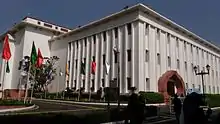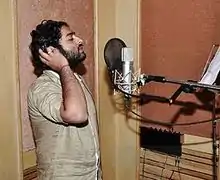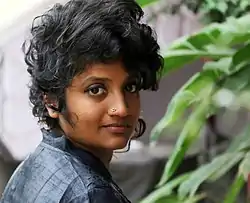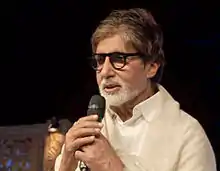National Film Awards
The National Film Awards is the most prominent film award ceremony in India. Established in 1954, it has been administered, along with the International Film Festival of India and the Indian Panorama, by the Indian government's Directorate of Film Festivals since 1973.[3][4]
| National Film Awards | |
|---|---|
| Current: 66th National Film Awards | |
 Vigyan Bhavan, where the National Film Awards are held annually | |
| Awarded for | Excellence in cinematic achievements for Indian cinema |
| Location | Vigyan Bhavan, New Delhi |
| Country | India |
| Presented by | Directorate of Film Festivals |
| Hosted by | New Delhi |
| First awarded | 10 October 1954 |
| Last awarded | 9 August 2019 |
| Website | dff.nic.in |
| |||||||||||||||||||||||||||||||||||||||||||||||||
| |||||||||||||||||||||||||||||||||||||||||||||||||
| |||||||||||||||||||||||||||||||||||||||||||||||||
Every year, a national panel appointed by the government selects the winning entry, and the award ceremony is held in New Delhi, where the President of India presents the awards. This is followed by the inauguration of the National Film Festival, where the award-winning films are screened for the public. Declared for films produced in the previous year across the country, they hold the distinction of awarding merit to the best of Indian cinema overall, as well as presenting awards for the best films in each region and language of the country. Due to the national scale of the awards, they are believed to be the most prestigious cinema awards in India. This award show have been of referred to as Indian film industry's equivalent to the Academy Awards in the United States, and it is till date.
History
The Awards were first presented in 1954. The Government of India conceived the ceremony to honour films made across India, on a national scale, to encourage the furthering of Indian art and culture. Since 1973, the Indian Directorate of Film Festivals administers the ceremony along with other major film events in India annually.
Juries and rules
The National Film Awards are presented in two main categories: Feature Films and Non-Feature Films. The juries are appointed by the Directorate of Film Festivals in India. Neither the Government nor the Directorate have influence over which films are selected for consideration and which films ultimately win awards. There are strict criteria as to whether a film is eligible for consideration by the jury panels. Over 100 films made across the country are entered in each category (Feature and Non-Feature) for the awards and deemed eligible each year.
A list of rules is presented every year in a document of regulations known as the National Film Award Regulations. The criteria for eligibility contains many clauses. Among them, there is a direct requirement for the makers of a film, and particularly the director, to be Indian nationals.[5] Films entering the competition should be produced in India, and in case of co-production involving a foreign entity, there are as many as six conditions which should be fulfilled in order for the film to qualify.[5] According to the criteria, in order to be eligible for consideration of the jury, a film should be certified by the Central Board of Film Certification between 1 January and 31 December. Whether a film is considered a feature film or a non-feature film shall be decided by the Feature Film jury. The eligibility list includes a section of rules determining which films shall not be eligible for entry in the competition.[5]
Awards
The Awards are categorised in three sections; Feature Films, Non-Feature Films and Best Writing on Cinema. With each section having its individual aims, Feature Film and Non-Feature Film sections aim at encouraging the production of films of aesthetic and technical excellence and social relevance, contributing to the understanding and appreciation of cultures of different regions of the country in cinematic form, thereby promoting unity and integrity of the nation. The Best Writing on Cinema section aims to encourage the study and appreciation of cinema as an art form and dissemination of information and critical appreciation of the art form through publication of various books, articles, reviews, newspaper coverage and studies.[6]
In addition, a lifetime achievement award, named after the father of Indian cinema Dadasaheb Phalke, is awarded to a film personality for the outstanding contribution to the growth and development of Indian Cinema.[6][7]
All the award winners are awarded with a Medallion, cash prize and a certificate of merit. Six categories from Feature Films section, two from Non-Feature Films and Best Writing on Cinema sections each have been made eligible for Swarna Kamal (Golden Lotus Award) and rest of the categories for Rajat Kamal (Silver Lotus Award).[6]
Lifetime Achievement Award
Golden Lotus Award
Official name - Swarna Kamal
Silver Lotus Award
Official Name: Rajat Kamal
- Best Actor
- Best Actress
- Best Supporting Actor
- Best Supporting Actress
- Best Child Artist
- Best Music Direction
- Best Male Playback Singer
- Best Female Playback Singer
- Best Lyrics
- Best Art Direction
- Best Audiography
- Best Choreography
- Best Cinematography
- Best Costume Design
- Best Editing
- Best Make-up
- Best Screenplay
- Best Special Effects
- Best Stunt Choreography
- Special Jury Award
- Special Mention
Best Feature Film in 17 of the 22 languages specified in the Eighth Schedule of the Constitution of India:
- Best Feature Film in Assamese
- Best Feature Film in Bengali
- Best Feature Film in Bodo
- Best Feature Film in Dogri
- Best Feature Film in Gujarati
- Best Feature Film in Hindi
- Best Feature Film in Kannada
- Best Feature Film in Kashmiri
- Best Feature Film in Konkani
- Best Feature Film in Malayalam
- Best Feature Film in Manipuri
- Best Feature Film in Marathi
- Best Feature Film in Odia
- Best Feature Film in Punjabi
- Best Feature Film in Tamil
- Best Feature Film in Telugu
- Best Feature Film in Urdu
Best Feature Film in each of the languages other than those specified in Eighth schedule of the Constitution of India:
Discontinued Awards
Silver Lotus Award
Official Name: Rajat Kamal
- Best Agriculture Film
- Best Animation Film
- Best Anthropological / Ethnographic Film
- Best Arts / Cultural Film
- Best Biographical Film
- Best Educational / Motivational / Instructional Film
- Best Environment/Conservation/Preservation Film
- Best Exploration / Adventure Film
- Best Film on Family Welfare
- Best Historical Reconstruction / Compilation Film
- Best Investigative Film
- Best Promotional Film
- Best Scientific Film
- Best Short Fiction Film
- Best Film on Social Issues
Discontinued Awards
References
- "66th National Film Awards" (PDF). Directorate of Film Festivals. Retrieved 9 August 2019.
- "65th National Film Awards" (PDF) (Press release). Directorate of Film Festivals. p. 21. Archived from the original (PDF) on 6 June 2017. Retrieved 13 July 2017.
- Official site Directorate of Film Festivals
- Film Festival Archived 17 June 2008 at the Wayback Machine
- 55th National Film Awards Regulations. Eligibility. Pages 2–3.
- "59th National Film Awards: Regulations" (PDF) (Press release). Directorate of Film Festivals. p. 2,4,12,14,22,24,25,30. Archived from the original (PDF) on 24 March 2012. Retrieved 29 July 2012.
- "Dadasaheb Phalke Award Past Recipients". Directorate of Film Festivals. Retrieved 13 August 2012.
Further reading
- Matthew, K.M. (2006), Manorama Yearbook 2006, Malayala Manorama, India, ISBN 81-89004-07-7
External links
| Wikimedia Commons has media related to National Film Awards, India. |



%252C_Swanand_Kirkire_(Lyricist).crop.jpg.webp)
.jpg.webp)





